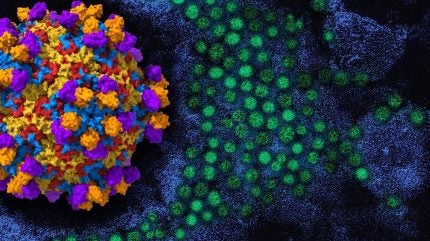
The US National Institutes of Health (NIH) has announced the commencement of a Phase I clinical trial of EV68-228-N, an investigational monoclonal antibody for treating enterovirus D68 (EV-D68), which can lead to severe respiratory and neurological illnesses.
Sponsored by the National Institute of Allergy and Infectious Diseases (NIAID) unit of the NIH, the trial will assess the safety of EV68-228-N, its longevity in the body and the most effective dosage.

Discover B2B Marketing That Performs
Combine business intelligence and editorial excellence to reach engaged professionals across 36 leading media platforms.
Participants for the trial will be enrolled at the University of Maryland, College Park, and involve collaboration with various academic medical centres across the US.
It is part of the NIAID-funded Infectious Diseases Clinical Research Consortium, which includes the Vaccine and Treatment Evaluation Units.
The study aims to enrol 36 healthy subjects aged between 18 and 49 years, with six set to receive a placebo and the remaining 30 to be given varying intravenous doses of EV68-228-N.
To ensure safety, the first two participants in each treatment group will be monitored for at least 72 hours before the subsequent administration.

US Tariffs are shifting - will you react or anticipate?
Don’t let policy changes catch you off guard. Stay proactive with real-time data and expert analysis.
By GlobalDataSubsequently, the researchers will conduct nine further in-person assessments over the following 120 days.
EV68-228-N was developed by scientists from Vanderbilt University Medical Center in collaboration with Utah State University, KBio, and ZabBio, after isolating a neutralising antibody from patients who had recovered from EV-D68.
The antibody effectively neutralised multiple strains of EV-D68 from various epidemics in laboratory models.
KBio is manufacturing the antibody using its plant-based protein development platform.
EV-D68 is believed to spread through coughs, sneezes, or contaminated surfaces. There are currently no FDA-approved treatments for severe EV-D68 infections or acute flaccid myelitis.
In a media release, the NIH said: “According to the CDC, EV-D68 was first identified in California in 1962 and is one of more than 100 non-polio enteroviruses. EV-D68 typically causes respiratory illnesses that are mild.
“Non-polio enteroviruses are very common. Most infections are asymptomatic or cause mostly mild symptoms, such as runny nose, sneezing, cough, rash, mouth sores, body aches, and muscle aches. Severe symptoms may include wheezing and difficulty breathing.”





